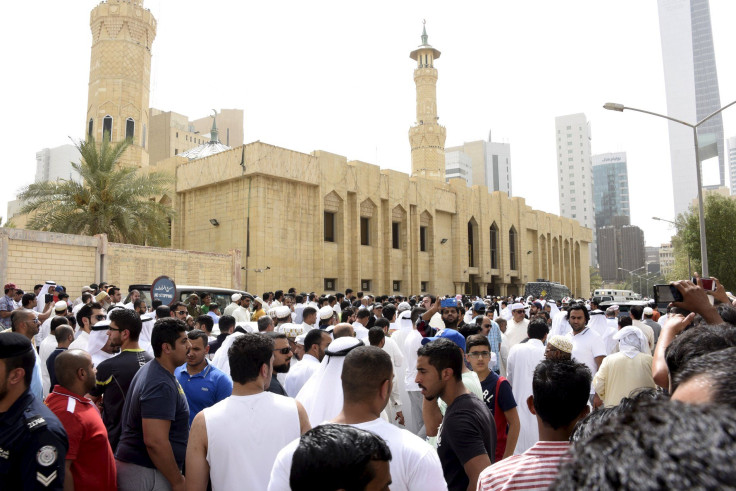Kuwait Shiite Mosque Attack: Islamic State Claims Ramadan Suicide Blast, At Least 15 Dead

The Islamic State group has claimed credit for a suicide attack on a Shiite mosque in Kuwait’s capital Friday that left at least 15 people dead. A post on a Twitter account belonging to the group, also known as ISIS, said the attack on the Imam Sadiq Mosque in Kuwait City had been carried out by an ISIS affiliate called the Najd Province, the same group that claimed it carried out two recent attacks on Shiite mosques in Saudi Arabia, the Associated Press reported.
The attackers struck after Friday prayers during the holy month of Ramadan, when attendance typically increases at mosques. One witness told the AP that the roughly 2,000 worshippers were participating in a group prayer when the explosion struck near the door of the mosque. ISIS regards Shiites as heretics. A Twitter statement by the group after the attack said the bomber had targeted a “temple of apostates.”
Medics at the scene had earlier said that the bombing killed at least 13 people, while 25 others were hospitalized, Agence France-Presse reported.
A Kuwaiti parliament member told Reuters that worshippers were kneeling in prayer when the suicide bomber entered from the side of the mosque and blew himself up, destroying walls and the ceiling. "It was obvious from the suicide bomber's body that he was young. He walked into the prayer hall during sujood [kneeling in prayer], he looked ...in his 20s, I saw him with my own eyes," Khalil al-Salih told the news agency.
BREAKING: Explosion inside Shia mosque in #Kuwait City, reports of multiple casualties http://t.co/YZeWsJpBKR pic.twitter.com/3XESPvhRcO
— RT (@RT_com) June 26, 2015"The explosion was really hard. The ceiling and wall got destroyed," al-Salih said, adding that more than 2,000 people from the Shi'ite Ja'afari sect were praying at the mosque. Shiites make up about one-third of Kuwait’s native population of 1.3 million people.
Torn #Quran at the Imam Sadiq Mosque, #Kuwait, where #Daesh suicide bomber killed many worshippers #EnemiesofGod pic.twitter.com/Dwmthf36A8
— Mohammed Al-Hilli (@malhilli) June 26, 2015#تفجير_مسجد_الإمام_الصادق اللهم عليك بالظالمين و أعداء المسلمين و قاتلي المصلين ! #مع_الكويت_ضد_الارهاب pic.twitter.com/Bj8GTgWJVY
- حسن سجواني (@HSajwanization) June 26, 2015
Kuwait’s Islamic Affairs minister Yacoub al-Sanna called the attack a “terrorist and cowardly action which threatens our nation and works at tearing apart the national unity," Al-Sanna added that the government would take all necessary measures to protect houses of worship in the country. "Kuwait was and will remain the oasis of security and safety to all components of the Kuwaiti society and sects," he said.
Footage from Kuwaiti state television showed the emir, Sheikh Sabah al-Ahmed al-Sabah, surveying the damaged mosque after the attack, Reuters reported. Citizens were urged to stay away from the scene to allow authorities to investigate.
Ramadan started June 18 and runs through July 16.
© Copyright IBTimes 2024. All rights reserved.












